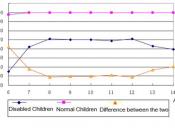Running head: INCLUSIVE EDUCATION FOR OR AGAINST
Inclusive Education Practices Information Booklet
Chris Ware
Abstract
Part 1. An analysis of Inclusion Education Policies.
This paper is the first part of a Booklet. It is aimed at academics, teachers and allied health professionals. This essay endeavors to discuss current and past principles of Inclusion education practices and assess just how effective they are towards providing education for all individuals.
Inclusive Education Practices Information Booklet
Inclusion policies and their influence on education facilitation are determined by identifying the arguments for and against Inclusive Education. This involves assessing and substantiating three key areas. First, assessing influences of the Macro environment, in particular the Consequentialist, Justice, Rights and Needs arguments. Second, examining of the inter-relationship of inclusive education polices on the micro-environmental factors of parents. Third, evaluating the influence of Inclusive Educational Practices on teachers.
Soodak (2003) and Cole (1999) best describe inclusive educational practices as the process where individuals with disabilities receive their education, in general, atypical settings.
In comparison, Education Queensland's (2004) cs-15 Principles of Inclusive Policy document describes Inclusive curriculum as the development of knowledge, skills, attitudes and processes necessary to question how disadvantages have developed within current social structures, and to challenge rather than accept social injustice, and empower people to participate as equals.
Are Inclusive education practices the most effective medium to challenge social injustices and empower people to participate as equal? The pros and cons of Inclusive education policies are assessed by two components. The first component is the assessing Norlander's (1995) historical assessment and influence of American Inclusion policy development on Australian Inclusive education practices. The second component is the examination of the macro components of Inclusive education practice as established by Cole (1999). Norlander (1995) defines the first development towards Inclusive Education as the Institutionalization and...


